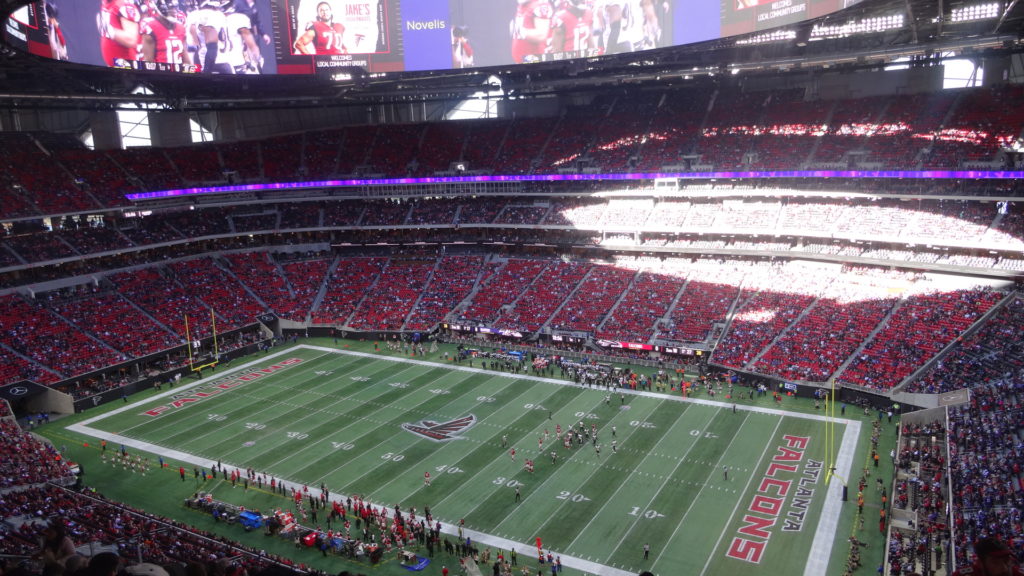This Sunday will be Super Bowl LIII for the NFL, number III for the city of Atlanta, and the very first for 17-month-old Mercedes-Benz Stadium.
Atlanta’s first bid for a Super Bowl was granted before Mercedes-Benz Stadium’s predecessor was even finished. On May 23, 1990, the Georgia Dome – scheduled to open two years later – was named the host of Super Bowl XXVIII. “We felt awful good about it going in,” Falcons owner Rankin Smith told UPI, “But you never know what can happen in a secret ballot… if there was one overriding factor, it had to be the new stadium.” Added Atlanta mayor Maynard Jackson, “This will be great for our city’s self-esteem, image and economy… The 1994 Super Bowl will be the best ever, we guarantee it.”
The political and social climate became charged in the lead-up to the game due to protests against the flag of the state of Georgia at the Georgia Dome, the Confederate ‘Southern Cross’ symbol prominently featured in its design. Georgia State Senator Ralph David Abernathy, reported the Los Angeles Times, “along with several other black legislators… wrote a letter to National Football League Commissioner Paul Tagliabue asking that the flag be barred from Sunday’s game.”
The game was played, Georgia state flag flying. Natalie Cole sang the National Anthem, a gospel choir behind her, with a stirring “America the Beautiful” mixed into her arrangement. And in the game itself, the Buffalo Bills played for the NFL championship for the fourth consecutive year and lost for the fourth consecutive year, relinquishing a 13-6 halftime lead and falling, 30-13, to the Dallas Cowboys. Super Bowl MVP Emmitt Smith rushed for 132 yards and two second-half touchdowns, part of Dallas’s string of 24 unanswered points.
Super Bowl XXVIII may not have lived up to Mayor Jackson’s guarantee, but at least there was no ice. The second Super Bowl at the Georgia Dome, Super Bowl XXXIV in 2000, presented a better contest and catastrophic conditions.
One week before the Super Bowl, on January 22, the first ice storm hit the Atlanta. The day before the game, January 28, the second ice storm struck. All told, the storms left some 500,000 homes without power, caused $48 million worth of damage, and led to hundreds of accidents – one a 47-car collision.
The game itself was magnificent. The story of the 1999 regular season, like the 2018 regular season, was the surprising Rams, thanks to a high-flying offense schematically ahead of the curve. (Simply substitute the city of St. Louis and 63-year-old head coach Dick Vermeil and 28-year-old quarterback Kurt Warner for today’s Los Angeles Rams of 32-year-old head coach Sean McVay and 24-year-old signal-caller Jared Goff.)
The Rams built a seemingly trustworthy 16-0 lead over the Tennessee Titans with three first-half field goals and a Torry Holt third-quarter touchdown reception, but two Titans touchdowns and an Al Del Greco field goal with 2:12 to play wiped out the deficit – the first time in Super Bowl history that a team had rallied from a deficit over 10 points. St. Louis responded on the very next play from scrimmage, a 73-yard Isaac Bruce catch-and-run for a 23-16 lead with only 1:54 to play. The late Steve McNair drove the Titans back down the field in search of the game-tying score. On the last play of the game, St. Louis linebacker Mike Jones tackled receiver Kevin Dyson one yard shy of the goal line as time expired, giving the Rams their first Super Bowl championship. It remains the franchise’s only Super Bowl title, entering Sunday’s match-up with New England.
Beyond the ice, there was one last moment to mar Atlanta’s Super Bowl weekend in national memory. Around 4 a.m. the Monday morning after the game, two young men were stabbed to death following an altercation at the Cobalt Lounge. Baltimore Ravens star linebacker Ray Lewis was charged with murder in the aftermath, with the charge later reduced to misdemeanor obstruction. Lewis pled guilty and served 12 months probation.
19 years later, with the Georgia Dome no longer in existence, the city of Atlanta will host its third Super Bowl. This year, again, there have been more troubles of the human and weather variety: the partial government shutdown that threatened air travel to Atlanta, an uncalled pass interference that aided the Rams in eliminating the New Orleans Saints in the NFC championship game, a polar vortex freezing much of the country this week, and a rainy Sunday forecasted for the Atlanta area.
In the end, will this Super Bowl at last live up to former Mayor Jackson’s hope that it would be positive for the city’s self-esteem, image and economy? Or will Atlanta be left looking forward to its fourth Super Bowl, whenever it arrives?
This article first appeared in the weekly Football Stadium Digest newsletter. Are you a subscriber? It’s free, and you’ll see features like this before they appear on the Web. Go here to subscribe to the Football Stadium Digest newsletter.

